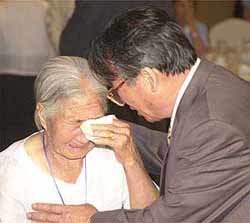When will we meet again? Family reunions must be regularized
When will we meet again? Family reunions must be regularized
Posted August. 17, 2000 20:54,

The four-day exchange visits by inter-Korean separated families on the occasion of Liberation Day have officially wrapped up. The visitors to the South and North, enjoying their dreamlike reunion, temporarily leave the pang of their long separation behind. They are now sorrowful due to their imminent parting and remain unsure when they will meet again. Yet, they are happier than those who have to endure their despair without knowing whether their family members are alive or not. Are there no ways to rectify this situation?
Experts pointed out that both the South and the North need to speed up resolving the divided family problem, using the Liberation Day family reunions as the turning point for the elimination of the lasting cold war legacy. The reunions and exchange visits must be regularized and systematized, so thatthe displaced families can meet one another at any place and at any time, rather than participating in demonstrative, casual and consumptive reunion programs. Lee Kum-Soon, a research fellow of the National Unification Research Institute, said that the two Koreas are promoting family reunions again in September and October. He stressed, however, that the question of the separated families should be addressed through the installation of a permanent meeting point.
Since the South and North Korean Red Cross societies agreed to discuss the issue of establishing the meeting venue in September, the two sides need to strive to make it possible for the displaced families to confirm the safety of their kin and to hold routine reunions, he asserted. He also said that the ongoing reunion project will be more meaningful when the families are allowed to exchange mail and remit money to each other.
The permanent meeting venue is important because the number of dispersed families is enormous. The first-generation North Koreans living in the South total some 1.23 million and if the second and third-generation divided familymembers are counted, the aggregate number totals some 7 million.
Already, a total of 76,793 people have filed applications with the Korean National Red Cross for meetings with separated kin in the North. With the ongoing family reunion providing momentum, 300 to 400 people are applying daily for the future reunions. Even if the two Koreas exchange 100 people per month, it is not easy to calculate how many years it would take to finish the job. If the ages of the first-generation families are taken into account, they would likely lose the opportunity to be reunited with their loved ones forever.
Moreover, the officials concerned estimate that the government spent 2 billion won to 3 billion won for the current family reunion program, including 350 million won for accommodations at the Sheraton Walker Hill Hotel, where the North Korean visitors are staying, and other expenses. The amount would enable 5,000 people to meet their kin at a point set up at the Mt. Kumgang resort, given that the total charge for one person¡¯s tour is 660,000 won.
Headline News
- Half of working seniors earn less than 1 million won per month
- S. Korea prepares to monitor N. Korean military activities amid POW concerns
- Shinsegae Group officially splits department stores and E-Mart affiliates
- Starbucks issues ‘come to the office 3 times a week or be fired’ notice
- Ha Hyeong-joo chosen as 2024 Sports Hero of Korea







